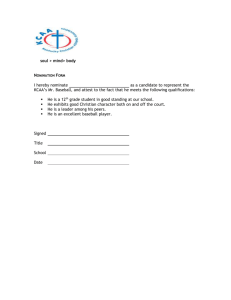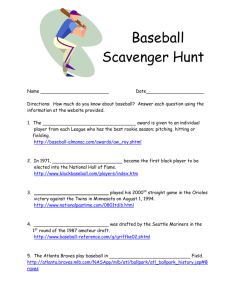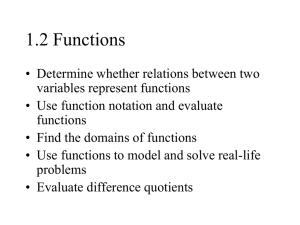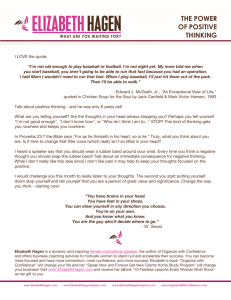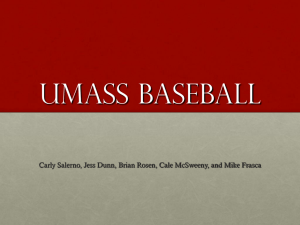Women Who Run the Game - Northern Illinois University
advertisement
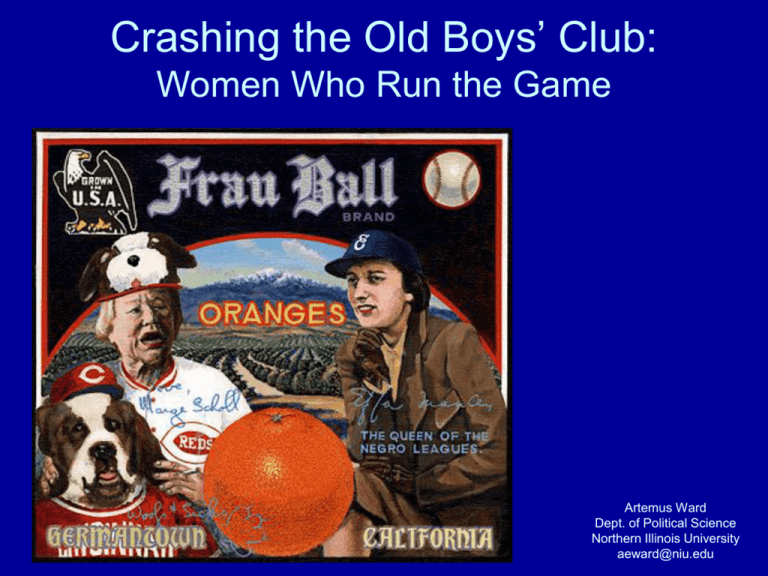
Crashing the Old Boys’ Club: Women Who Run the Game Artemus Ward Dept. of Political Science Northern Illinois University aeward@niu.edu Introduction • Baseball is a business and has always sought to expand its appeal particularly among women. • Women have been baseball fans and baseball players since the earliest days of the game. • But women have also been umpires, writers, executives, and owners. • In this lecture we will look at the history of women’s participation in baseball in a non-playing capacity. • While women have long demonstrated an ability to run the game, both on the field and off, opportunities for women continue to remain limited. Why? Female Fans • Baseball has always needed women to help legitimize the sport as “America’s game.” • From the earliest days women were encouraged to attend: special carriages were sometimes provided, or certain designated stands. Women were often admitted free, or free if they were accompanied by an escort. • Women’s association with baseball was thought to “elevate” the game, providing it with a moral dimension, and keeping it from becoming “brutish” if left only in the hands of men. Turn-of-the-Century Baseball Women • Amanda Clement was an umpire from 1905-1911. • Helene Britton (right) was the owner of the St. Louis Cardinals from 1908-1917. • In the late 1800s, there were also sportswriters such as Ella Black who wrote for The Sporting Life, and Sally Van Pelt who was the baseball editor of the Dubuque Times in Iowa. Joan Whitney Payson (1968) • • • • Joan Whitney Payson was a sports enthusiast who was a minority shareholder in the New York Giants Major League Baseball club. She and her husband opposed moving the team to San Francisco in 1957. After the majority of the shareholders approved the move, she sold her stock and began working to get a replacement team for New York City. Along with M. Donald Grant, the only other director who opposed the Giants' move, Payson put together a group that won a New York franchise in the Continental League, a proposed third major league. The National League responded by awarding an expansion team to Payson's group, which became the New York Mets. As a result, Payson became the first woman to buy majority control of a team in a major North American sports league, rather than inheriting it. Payson served as the team's president from 1968-1975. Active in the affairs of the baseball club, she was much admired by the team's personnel and players and was instrumental in the return of Willie Mays to New York City baseball in May 1972 by way of trade and cash from the Giants. She died in 1975. Bernice Shiner Gera (1972) • • • • • • In her mid-thirties, married, and working as a secretary, Gera decided to enroll in the Florida Baseball School in 1967 to train as an umpire. After the six-week training she was rejected as an umpire by the National Association of Baseball Leagues (NABL), which claimed she did not meet the physical requirements for the job. But she brought a lawsuit and won. On June 24, 1972 she umpired in a Class A minor league game between the Geneva Rangers and Auburn Phillies of the New York-Penn League. In the 4th inning, she ruled Auburn base-runer Terry Ford safe at 2nd base on a double play, then reversed her call. Auburn manager Nolan Campbell disputed the decision and said that Gera’s first mistake was putting on an umpire’s uniform, and that her second mistake was blowing the call. Campbell was ejected from the game. After the game was over Gera resigned saying she was disenchanted with umpiring because the other umpires refused to cooperate with her on the field. “Bernice would always say, ‘I could beat them in the courts, but I can’t beat them on the field,’” her husband quoted his wife as saying. She went on to work in promotions and community relations office for the New York Mets and died in 1992 at age 61. Pam Postema (1988) http://www.hulu.com/watch/60234/a-celebration-of-womens-history-lady-at-the-bat-pam-postema-poised-to-umpire-in-the-majors • • • • • • • After being rejected twice, Postema was admitted to umpire school in 1976. The following year she began her umpiring career in the rookie Gulf Coast League. She spent two years there, two years at single-A, two years at AA, and spent six seasons at AAA Pacific Coast League. In 1988 Commissioner Bart Giamatti offered her a contract to umpire a spring training game and wanted her to umpire the annual Hall of Fame game at Cooperstown, NY but Giamatti died before Postema was able to umpire a regular season major league game. After her spring training game, pitcher Bob Knepper said: “I just don’t think a woman should be an umpire. There are certain things a woman shouldn’t be and an umpire is one of them. It’s a physical thing. God created women to be feminine. I don’t think they should be competing with me. It has nothing to do with her ability. I don’t think women should be in any position of leadership. I don’t think they should be presidents or politicians. I think women were created not in an inferior position, but in a role of submission to men. You can be a woman umpire if you want, but that doesn’t mean it’s right. You can be a homosexual if you want, but that doesn’t mean that’s right either.” Postema’s contract was not renewed in 1989 and she eventually filed a sexual discrimination suit against major league baseball in federal court. The case was settled and she went on to be a truck driver for Federal Express. She published an autobiography: You’ve Got to Have Balls to Make It in This League and wrote: “Almost all the people in the baseball community don’t want anyone interrupting their little male-dominated way of life. They want big, fat male umpires. They want those macho, tobacco-chewing, sleazy sort of borderline alcoholics. If you fit their idea of what a good umpire is, then you’re fine. And isn’t that the way society is? Nobody wants any glitches. If somebody is a nonconformist like me…then we get shown the door. It’s hard to accept. And I’ll never understand why it’s easier for a female to become an astronaut or cop or fire fighter or soldier or Supreme Court justice than it is to become a major league umpire.” Elaine Weddington Steward • • • • • • Born in New York, Steward worked in many positions with the New York Mets while in school. She graduated from St. John’s University School of Law in 1987 and was chosen for MLB’s executive development program. She began working for the Boston Red Sox and became the team’s Associate General Counsel in 1988. In 1990 she was named Red Sox Assistant General Manager, the second African-American (after Bob Watson of the Houston Astros) named to the post. In 1995 she became legal counsel and was named Vice President in 1998. In 2002 her title was Red Sox Vice President and Club Counsel. She said: “I’ve found a job I love. And I’m doing what I’ve always wanted to do – sports management and the negotiation of player contracts. But one of the best things about working in a ballpark is when you get through your normal work day, and if there’s a home game, you have something to look forward to.” Jackie Autry (1999) • The wife of Hollywood star, and Los Angeles Angels owner Gene Autry, Jackie was named the Honorary President of the American League in 1999, after the AL ceased to be an independent entity and was folded into the MLB Central Office. • Her only task for the season is to present the American League Championship trophy, the William Harridge Award, to the champion at the end of the ALCS as well as the ALCS MVP award. • She is the only woman to ever serve on the Major League Baseball Executive Council, Oversight Committee, and as a member of the Board of Directors. Initiative on Women in Baseball (1999) • In 1999, MLB Commissioner Bud Selig announced the MLB was conducting a market study that involved research on female fans and their interest in the sport. • Conclusion: By a 2-1 margin, women said that baseball is their favorite sport to watch—on TV and in person. • By the 2002 season, 35% of attendees at baseball games were women and many teams reported that nearly half of their fans are women. • Why are women seemingly more attracted to baseball than other sports such as football and basketball? Jayne Churchmack • Cleveland Indians Vice President of Licensing and Merchandising. • She said in 2003: “The Indians rank No. 1 in the category of female directors and managers in Major League Baseball. Over 40% of our front office staff is women, and at least 45% of our fans are women. Baseball recognizes that women are a vital part of our fan base and of our workforce.” • Yet when women do work in the front office, they have generally occupied jobs in marketing, sales, and community and media relations. It is comparatively rare to find women working in the baseball operations side. http://youtu.be/4emI3-1tyAg Kris Rone • Executive Vice President of Business Operations for the Los Angeles Dodgers. • Doubled sponsorship and marketing revenue in her first 4 years with the team. • She created a premium-seat program for new suites and dugout seats in Dodger Stadium, renting the facility for non-baseball activities and developing additional sources of revenue in merchandise sales and corporate sponsorship. • She emphasized marketing to Latino fans and Latino attendance at the stadium increased 12% during her tenure. • Resigned in 2004 over philosophical differences with the new owners— Frank and Jamie McCourt. • • • • • • • • • A graduate of Northeastern University, Hurley worked for Ernst & Young accounting before joining the Walt Disney Co. She worked for Disney for 6 years consulting on contracts, license deals, and theatrical distribution agreements. She joined the Los Angeles Dodgers in 1998 as Director of Finance and Accounting. When Cristine Hurley joined the Los Angeles Dodgers organization four years ago, some people thought she was owner Peter O’Malley’s new assistant. “I was new and in a suit,” she says. “So the only thing I could be was an assistant or a secretary.” Similar confusion developed on team flights. “When the wives saw me,” Hurley says, “they asked, ‘Who is that?’ ‘Who is that?’ ‘Who is that?’ They finally concluded I was a backup flight attendant, because there wouldn’t be any other reason for me to be on that plane.” Promoted to Chief Financial Officer in June 1999 and received the Vice President of Finance title in November 2000. In April 2005 she was promoted to Sr. Vice President overseeing all financial aspects, including budgeting and financial reporting, of the Dodger organization. She reduced non-baseball expenditures by 10% during her tenure and worked to complete the sale of the Dodgerowned spring training facility in Vero Beach, FL, which drove $17.5 million in cash inflows for the team. In 2007 she joined the National Basketball Association (NBA) serving as Vice President of Team Finance. In 2009 she became a full-time sports finance consultant. Cristine Hurley Wendy Selig-Prieb • • • • • • Wendy Selig’s father was the owner of the Milwaukee Brewers. The Selig family has owned the team since it moved to Milwaukee from Seattle in 1970. Bud Selig put his 30% interest in the team in a blind trust when he became commissioner in 1998. Wendy got her start in the Brewers marketing department after graduating magna cum laude from Tufts University. She went on to serve in various positions with the Brewers including General Counsel. After her father became Commissioner, she was baseball's only female President and CEO from 1998 until 2002 when she stepped down from her executive positions but continued to chair the board of directors until the October 2004 sale of the team. Her husband Laurel Prieb, served in various capacities with the team, including — until 2004 — vice president of corporate affairs. He went on to become an executive of Major League Baseball. During Selig-Prieb's reign as CEO, the Milwaukee Brewers compiled a record of 480-652 a winning percentage of .420. The team was near triple digit losses every year, including one season with 106 losses. She also oversaw the construction of taxpayer-financed Miller Park, which opened in 2001 and was responsible for cutting the payroll each season prior to the team’s sale. In 2012 she was named president of Worth New York, a division of national women’s fashion company Worth Collection Ltd. • • • • • • • • • • Born in Indiana, Ng graduated from the University of Chicago where she played softball for four years and earned a degree in public policy. She began her career as a special projects analyst for the Chicago White Sox. With the Sox she handled the salary arbitration case of pitcher Alex Fernandez. She moved to the American League front office as Director of Waivers and Records, approving all player transactions. In 1997, at age 29, she was hired by the New York Yankees as Assistant General Manager In 2001 she was hired as the Assistant General Manager of the Los Angeles Dodgers. In 2005 she interviewed with the Dodgers for the job of General Manager (in charge of all player-personnel decision in the organization) but was not selected. In 2008 she again interviewed for a GM position this time with the Seattle Mariners. Again she was not hired. In 2009 she interviewed for the GM job with the San Diego Padres but was again passed over. She remarked in 2011: “If I had not interviewed for several General Manager positions, I would say maybe that position is closed off [to women] at this point. But I think with people being open-minded enough to give me an interview, I can’t say that there is any position at this point in the front office that is closed off.” In 2011 Ng left the Dodgers to become Senior Vice President of Baseball Operations for Major League Baseball. She remarked, “I’m a little surprised that we haven’t seen more women come up in entry-level positions through the ranks, at this point in time. My only hope is that women do get recognized, and that we can put some programs in place to really at least get women into he system.” Kim Ng http://youtu.be/DVzla99HN6o Jamie McCourt • • • • • • • • Raised in Baltimore, at the age of 9 Jamie told her mother that she wanted to own a baseball team. She earned her undergraduate degree from Georgetown, a law degree from Maryland, and an MBA from MIT where she wanted to do her thesis on buying a baseball team or building a ballpark but “not a single professor would sponsor it,” she said. She practiced law for 15 years and spent a decade as Vice President and General Counsel of The McCourt Company, her husband Frank’s real estate development firm. The McCourt’s bought the Dodgers in 2004 from Rupert Murdoch’s NewsCorp for $430 million. She became the top female executive in baseball as Chief-Executive-Officer, President, and Vice Chair of the Dodgers, overseeing all aspects of the business, from leading weekly meetings with senior management to launching strategic development, marketing, and outreach initiatives. One of her initiatives, called Dodgers WIN (Women’s Initiative and Network), offered clinics, seminars and other female-friendly events that she hoped would expand the role of women in baseball. She said: “Forty percent of our fan base is female, but very few women are visible in baseball. What we want to do is create partnerships, so women can have a relationship with the Dodgers that stretches beyond the game.” But not all is what it appeared to be… The McCourt Divorce and Dodger Ownership Dispute • • • • • In 2009 the McCourts announced they were separating after 30 years of marriage. One week later Frank fired Jamie as CEO, accused her of having an affair with her driver who was employed by the team, and changed the locks on her office. She subsequently filed for divorce. He claimed he was sole owner of the team, litigation ensued, and a settlement was ultimately reached in 2011. Jamie received $130 million and relinquished her claim to the team, ending the costliest divorce in California history. LA Times columnist Bill Plaschke summed up how the McCourts failed and Jamie in particular: “Turns out, she was nothing but window dressing, cut and decorative and completely devoid of reality. While it was Frank’s whacked vision that robbed the Dodgers of their soul, it was Jamie’s clumsy machinations that took away their hear. Together they didn’t know anything about owning or running a baseball team, but they had too much ego to ask…. The furious tone was set by Jamie, who fired some good people, forced some other good people to quit, and generally created a bullying atmosphere that did not encourage good people to join. She tried to rebuild the organization in her image because, as it turns out, she was only concerned with that image. She preached community but only practiced Jamie. She talked about teamwork but only huddled with Jamie…. It became obvious that she intended to own the Dodgers not as a baseball team trying to win championships, but as a McCourt vehicle trying to win political friends. She not only couldn’t run the Dodgers, she had absolutely no concept of the Dodgers. In the end, Jamie McCourt’s legacy will not be what she did, but what she didn’t do. Her legacy will not be about court-alleged indiscretions or unconscionable support demands, but about her failure to turn that aggressiveness into community leadership and championship baseball. She didn’t manage. She didn’t mentor. She could have changed our world, but instead seemingly cared only about spending thousands to change flowers in an office that was finally taken from her, by a team that has finally, mercifully, been released from her grip. One down, one to go.” MLB took over the team in April 2011. Commissioner Bud Selig cited “deep concerns for the finances and operations” of the Dodgers who allegedly could not make payroll and who were heavily in debt. In June 2011 the Dodgers filed for Bankruptcy. Frank and MLB battled in Court until a settlement was reached to put the team up for sale. The team was sold in 2012 for $2 billion. Working Women in Baseball (2008) • • • • • In 2008, female baseball employees, 3/4 from the minor leagues, began their own conference at the annual baseball winter meetings where baseball executives have traditionally gathered to network. The event was started by Heather Raburn, a former softball player at New Mexico State University and a senior account manager for marketing with Minor League Baseball. About 100 women participate in a 2-hour seminar to exchange ideas, offer support and encouragement, and build a growing network of women in the sport. Topics included career and family, leadership qualities, workplace etiquette, communications skills for women, advancing in your career, and recognizing and/or increasing your value. Raburn said: “It’s more of a networking event. It’s a chance to talk to other women in the same position and find out how they are handling situations and hear their insights on different topics.” The event has recently been copied by Japanese baseball executives. The Front Office • Of the staff in MLB’s Central Office, women made up 38% of the positions based on 2010 MLB workforce data. • According to MLB, at the director and managerial level, women occupied 32% of the front-office positions at the MLB Central Office based on 2010 MLB workforce data. • The Boston Red Sox, San Francisco Giants and Houston Astros led MLB with 6 women each in vice president positions. The Arizona Diamondbacks and Los Angeles Dodgers each had 3 in 2010. 23 MLB teams have at least one woman in a vice president position. • In the 2010 MLB season, women held 18% of senior administration positions. • The percentage of women in professional positions with MLB teams was 32% in 2010. • As of 2011, Jennifer Steinbrenner-Swindal, Jessica Steinbrenner and Joan Steinbrenner each held a Vice-Chairman position for the New York Yankees. They are the only women who hold ownership. Pam Gardner • • • • • Pam Gardner was working at an advertising agency in Chicago when she moved to Houston in 1989, sent an unsolicited résumé to the Houston Astros and was hired as director of communications. She steadily added additional duties after Drayton McLane purchased the team in 1992. “As we were trying to revitalize the Astros, we saw her skills as a marketer and in sales,” McLane said. “She played an important role in helping plan the strategy of the [public] referendum and planning and building the [new publicly financed] stadium.” In 2001 she was named one of the team’s two Presidents (handling business operations), becoming the only female CEO/President in MLB. She resigned in January 2012 in the wake of McLane’s sale of the club to shipping logistics executive Jim Crane. McLane said executive changes are par for the course in MLB, adding, “When we came in in 1992, we wanted to change a lot of the people who had been working for John McMullen. We hate to see this change, but Pam had been with this team for years and wanted to move on to something else in her life.” Jean Afterman http://youtu.be/8soP8IqOS2A • • • • • • Afterman graduated from the University of California at Berkeley in 1979 and received her JD from the University of San Francisco School of Law in 1991. From 1994 to 1999, she was General Counsel at KDN Sports, Inc., a playeragent, and handled business and legal affairs for international baseball clients. She went on to manage her own legal practice, providing athletic representation and management with a specialization in arbitration proceedings. Since 2001, Jean Afterman has been the New York Yankees’ Assistant General Manager. She was promoted to Senior Vice President in 2011. She became only the third female to hold the assistant GM position in Major League Baseball (MLB) history. Afterman’s diverse business and legal background made her instrumental in the Yankees’ efforts to spearhead operations in Asia and the signing of three-time MVP Hideki Matsui. Q&A with Jean Afterman • • You don’t see many women in this business. Can more be done to open it up? One of the most fundamental gender issues in baseball is that people see a woman in baseball and feel a disconnect. People don’t understand what she’s doing there, and think she can’t possibly be doing what they were told she is doing, especially if it’s a traditionally “male” function, such as working in baseball operations front office. It’s a tricky thing, because you should always hire somebody based on merit and not on gender. And I think there’s a hesitancy to hire people who didn’t play the game. My colleague, Kim Ng, the Assistant GM with the Dodgers, actually did play college softball, I believe. It’s also difficult for a young woman to get a job in baseball, because there could be some perceived awkwardness about certain things a front office employee might do as a matter of routine, such as being in the clubhouse or trainers’ room. I don’t have a problem with that, because I recognize the situation and accommodate for it. Without belaboring any similarities to the theater, the same potential for awkwardness exists when men would walk into a woman’s dressing-room, so I am sensitive to it. I do think Major League Baseball could do more to encourage, or even assist, qualified women to become involved in the baseball front offices. Q&A with Jean Afterman • Some people say you will, at some point, be a General Manager. Is that something you have envisioned for yourself? • It would be dishonest to say never. This may sound disingenuous, but right now I want to get as close to perfect in this chair as I possibly can. I think the decision to accept a GM job is one that has to be carefully thought out, because if you’re the first or second woman GM, the truth is that you’re going to be more harshly scrutinized and judged on a different standard than the average male GM. You could essentially mess it up for all the women to come, unless you are fairly close to perfect. So you can’t accept a job or seek a position unless you’re absolutely positive that you can fully succeed in all aspects. The margin for error is slim, and putting together a championship baseball team is neither an art, nor a science, but a little of both, with a lot of luck thrown in. Conclusion • Have women made strides over time in terms of running the game of baseball? • Women hold roughly 1/3 of front-office positions but few, if any, have significant input in player-personnel, and on-field decisions. There has never been a female general manager, manager, or coach. • While there have been a few women owners in the past, the game of baseball is essentially owned by men. • Does this matter? References • • • • • • • • • • • • Berlage, Gai Ingham. 1994. Women in Baseball: The Forgotten History. Praeger. Elias, Robert. Baseball and the American Dream: Race, Class, Gender, and the National Pastime. Fluke, Cecily J. 2003. “Female Execs Step Up To The Plate,” Forbes, April 25. Gregorich, Barbara. 1993. Women at Play: The Story of Women in Baseball. Harcourt Brace & Co. Josephs, Susan. “Jamie McCourt: Bringing Women Into Baseball,” Aspire. Lanctot, Neil. 2004. Negro League Baseball: The Rise and Ruin of a Black Institution. University Press of Philadelphia. Lapchick, Richard, et. al. 2011. “The 2011 Racial and Gender Report Card: Major League Baseball.” The Institute for Diversity and Ethics in Sports. Plaschke, Bill, 2011. “Jamie McCourt’s Dodgers’ Legacy is One of Taking and Not Giving,” Los Angeles Times, October 18. Remington, Alex. 2011. “Ng Disappointed in Lack of Women in MLB,” Fangraphs.com, March 17. Rykoff, Amanda. 2010. “At Winter Meetings, Women Crash the Old Boys’ Club,” ESPNW, December 8. Turner, Renee D. 1990. “Introducing: Elaine C. Weddington; First Woman Baseball Executive – Boston Red Sox’s Assistant General Manager,” Ebony, July. Waldstein, David. 2009. “A Winter Meeting Designed by and for Women in Baseball,” New York Times, December 12.
